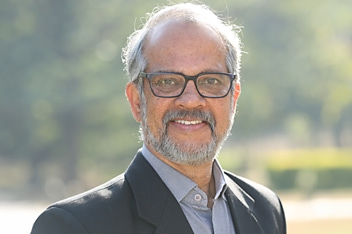About TSCFE
The Thomas Schmidheiny Centre for Family Enterprise was launched on February 7, 2015 with an aim to advance real-world and academic knowledge of family business. Since its inception, the Centre has been bringing together faculty and practitioners from India and abroad with the broad aim of combining theory and practice to enhance research and innovation in the field.
Recent Journal Publications
Cases
White Papers
Books&Book Chapters
Working Papers
Research - Advancing the Knowledge and Practice of Family Business
The Thomas Schmidheiny Centre for Family Enterprise at the ISB conducts and promotes cutting-edge research in the growing field of family business. Despite their significant contribution to the Indian economy, family businesses remain a largely unexplored area of research.
People
Professor Kavil Ramachandran is the Executive Director for the Thomas Schmidheiny Centre for Family Enterprise since its inception in 2015. The Centre is supported by a dedicated and experienced team of research and managerial staff who contribute to the research projects, teaching, mentoring and various outreach initiatives. The Centre is also affiliated with faculty and research fellows that contribute to the teaching and research activities at the Centre respectively.
Education - A Platform for Learning and Enrichment
Transformation of family businesses require focused training inputs. To prepare and train family members associated with their businesses, operationally or otherwise to take up higher levels of responsibilities, the Centre colloborates with Centre for Executive Education and offers an array of training programmes on different aspects of family business. These include family wealth management, family governance, managing growth in the family business, family philanthropy and managing family business boards. The Centre is also supporting ISB in the initiative to run a unique masters level programme MFAB for young family members who wish to enter the family business in the future. In addition, students enrolled in the Post Graduate Programme in Management of the ISB gain extensive theoretical and practical knowledge about family firms from the course, “Strategy, Leadership and Resource Management in Family Business.”
Knowledge Dissemination
The Centre disseminates knowledge in the field of family business management through articles in business and popular media vehicles across the world. Several of the articles authored by members of our team have been published in publications such as, CampdenFB, HBR Ascend, Tharawat Magazine for Family Business, the Economic Times, Business Standard, Business Today, Business India, Entrepreneur, and Rediff.com.
The Centre also regularly provides expert comments in media stories and articles on family business. Annually, the Centre also contributes to knowledge dissemination through practice-oriented family business research article summaries in FFI Practitioner – an online newsletter published by the Family Firm Institute, Boston, USA.
Networking
The Centre has expanded its impact through establishing a network of academic, industry and institutional linkages in India and abroad through several personal and institutional networks. In academics and research the Centre has built a strong network with faculty members from the Kellogg School of Management, University of Victoria, Ipag Business School, and University of Vermont. The Centre is an institutional member of the Successful Transgenerational Entrepreneurship Practices (STEP) – a global applied research initiative of top B-Schools across the world. The Centre also has strong institutional connect with industry bodies such as CII and FICCI.














